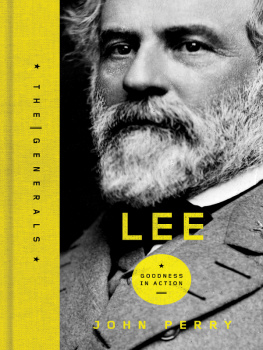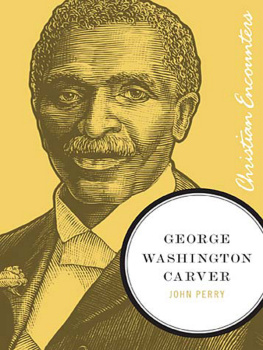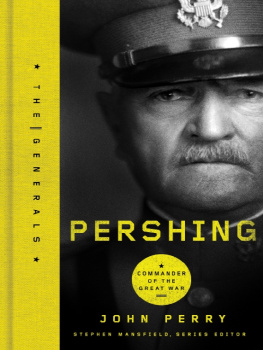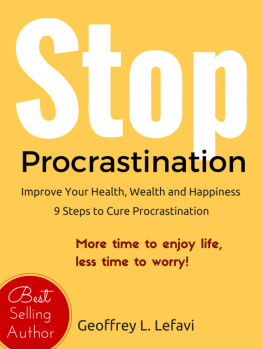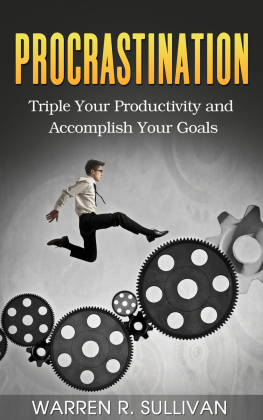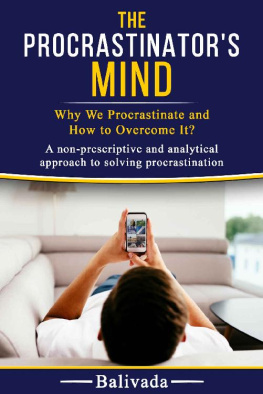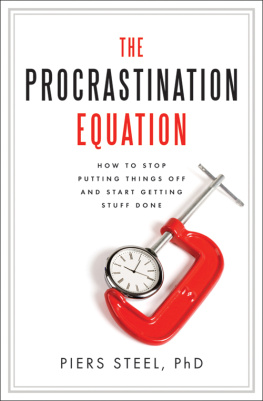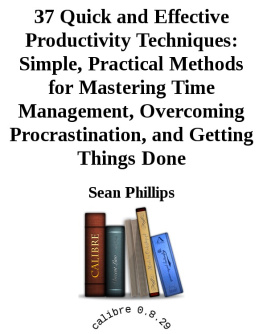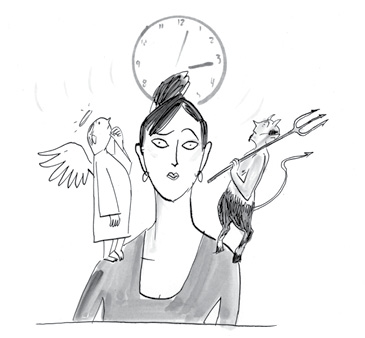John Perry - The Art of Procrastination: A Guide to Effective Dawdling, Lollygagging and Postponing
Here you can read online John Perry - The Art of Procrastination: A Guide to Effective Dawdling, Lollygagging and Postponing full text of the book (entire story) in english for free. Download pdf and epub, get meaning, cover and reviews about this ebook. year: 2012, publisher: Workman Publishing, genre: Romance novel. Description of the work, (preface) as well as reviews are available. Best literature library LitArk.com created for fans of good reading and offers a wide selection of genres:
Romance novel
Science fiction
Adventure
Detective
Science
History
Home and family
Prose
Art
Politics
Computer
Non-fiction
Religion
Business
Children
Humor
Choose a favorite category and find really read worthwhile books. Enjoy immersion in the world of imagination, feel the emotions of the characters or learn something new for yourself, make an fascinating discovery.

- Book:The Art of Procrastination: A Guide to Effective Dawdling, Lollygagging and Postponing
- Author:
- Publisher:Workman Publishing
- Genre:
- Year:2012
- Rating:3 / 5
- Favourites:Add to favourites
- Your mark:
The Art of Procrastination: A Guide to Effective Dawdling, Lollygagging and Postponing: summary, description and annotation
We offer to read an annotation, description, summary or preface (depends on what the author of the book "The Art of Procrastination: A Guide to Effective Dawdling, Lollygagging and Postponing" wrote himself). If you haven't found the necessary information about the book — write in the comments, we will try to find it.
This is not a book for Bill Gates. Or Hillary Clinton, or Steven Spielberg. Clearly they have no trouble getting stuff done. For the great majority of us, though, what a comfort to discover that were not wastrels and slackers, but doers . . . in our own way. It may sound counterintuitive, but according to philosopher John Perry, you can accomplish a lot by putting things off. He calls it structured procrastination:
In 1995, while not working on some project I should have been working on, I began to feel rotten about myself. But then I noticed something. On the whole, I had a reputation as a person who got a lot done and made a reasonable contribution. . . . A paradox. Rather than getting to work on my important projects, I began to think about this conundrum. I realized that
I was what I call a structured procrastinator: a person who gets a lot done by not doing other things.
Celebrating a nearly universal character flaw, The Art of Procrastination is a wise, charming, compulsively readable bookreally, a tongue-in-cheek argument of ideas. Perry offers ingenious strategies, like the defensive to-do list (1. Learn Chinese . . .) and task triage. He discusses the double-edged relationship between the computer and procrastinationon the one hand, it allows the procrastinator to fire off a letter or paper at the last possible minute; on the other, its a dangerous time suck (Perry counters this by never surfing until hes already hungry for lunch). Or what may be procrastinations greatest gift: the chance to accomplish surprising, wonderful things by not sticking to a rigid schedule. For example, Perry wrote this book by avoiding the work he was supposed to be doinggrading papers and evaluating dissertation ideas. How lucky for us.
ReviewThis is a fun audiobookguaranteed to make fellow procrastinators chuckle and laugh throughout its relatively short run time. By the way, it took John Perry 16 years to turn his essay into a book and it may well have been worth the wait.
DWDs Reviews
(DWDs Reviews )
With a charming brand of vocal confidence and one of the clearest baritone voices in audio, Brian Holsopple does a wonderful job of delivering . . . [Perrys] invitation for procrastinators to stop beating themselves up.
AudioFile
(AudioFile )
About the AuthorJohn Perry is an emeritus professor of philosophy at Stanford University and currently teaches at UC Riverside.
He is the co-host of the nationally syndicated public radio program Philosophy Talk, and winner, in 2011, of an Ig Nobel Prize in Literature for the essay Structured Procrastination. He lives with his wife in Palo Alto, California.
John Perry: author's other books
Who wrote The Art of Procrastination: A Guide to Effective Dawdling, Lollygagging and Postponing? Find out the surname, the name of the author of the book and a list of all author's works by series.


